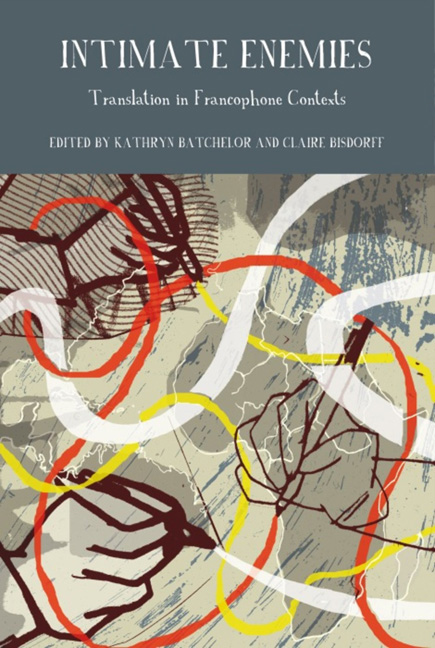Book contents
- Frontmatter
- Contents
- Illustration
- Acknowledgements
- Introduction: Translation – Formidable Enemy or Needed Friend?
- The Translation Market: Publishing and Distribution
- Writing and Translating in Practice
- Translation Challenges and New Avenues in Postcolonial Translation Theory
- Subverting Subversion? Translation Practice and Malpractice in the Work of Patrick Chamoiseau
- ‘Un art de la fugue’: Translating Glissant's Poetry, Fiction and Prose d'idées
- Postcolonial Intertextuality and Translation Explored through the Work of Alain Mabanckou
- Ananda Devi as Transcolonial Translator
- Translation and Current Trends in African Metropolitan Literature
- Notes on Contributors
- Index
Postcolonial Intertextuality and Translation Explored through the Work of Alain Mabanckou
from Translation Challenges and New Avenues in Postcolonial Translation Theory
- Frontmatter
- Contents
- Illustration
- Acknowledgements
- Introduction: Translation – Formidable Enemy or Needed Friend?
- The Translation Market: Publishing and Distribution
- Writing and Translating in Practice
- Translation Challenges and New Avenues in Postcolonial Translation Theory
- Subverting Subversion? Translation Practice and Malpractice in the Work of Patrick Chamoiseau
- ‘Un art de la fugue’: Translating Glissant's Poetry, Fiction and Prose d'idées
- Postcolonial Intertextuality and Translation Explored through the Work of Alain Mabanckou
- Ananda Devi as Transcolonial Translator
- Translation and Current Trends in African Metropolitan Literature
- Notes on Contributors
- Index
Summary
The work of the prize-winning francophone author Alain Mabanckou, originally from Congo-Brazzaville and currently based in California, is characterized by an intense intertextuality, often evident in the very titles of the works themselves. Mabanckou's 2003 novel, African Psycho, for example, provides an obvious echo of Bret Easton Ellis's classic, American Psycho, while the reference to the ancient Arveni chieftain in Les Petit-fils nègres de Vercingétorix sets that novel within a network of intertextual connections that draw on the same figure, including most notably the Asterix series. Black Bazar is less obviously intertextual in its title (although Koffi Anyinefa (2010: 287) suggests that there are echoes there of the non-fictional Black Paris by Benetta Jules-Rosette (1998) as well as a novel by Félix Bankara, Black Micmacs (1988), amongst other texts), but contains numerous intertextual references within its pages. In the opening section, for example, in which Roger Le Franco-Ivoirien mocks the narrator for his decision to write a book, and asks him whether he will at least be including particular motifs or themes belonging to world literature, the motifs and themes that he cites are traceable to a wide variety of texts, spanning a whole range of languages and traditions: Saint-Exupéry's Le Petit Prince, Ernest Hemingway's The Old Man and the Sea, a short story (also adapted to a film) by the Chilean writer Luis Sepúlveda, The Old Man Who Read Love Stories, a Japanese novel by Yukio Mishima, La Musique, Amos Tutuola's The Palm-Wine Drinkard, El Amour en los tiempos del cólera by Gabriel Garcia Márquez, the Argentinian writer Ernesto Sábato's El Túnel, and Günter Grass's Die Blechtrommel.
The novel in which the issue of intertextuality is most pertinent, however, is Verre cassé. Like Black Bazar, Verre cassé features a narrator who is self-consciously developing his novel and throughout the novel intertextual references of many different kinds abound: there are numerous biblical references, the occasional nod to philosophy (notably a bawdy use of the Kantian term, Ding-an-sich), and discussions of various cultural manifestations including the work of the African sculptor Ousmane Sow, films by Alfred Hitchcock, songs by George Brassens, and a range of Western writers and painters. Above all, however, the novel is characterized by frequent unsignalled citations of titles of other texts.
- Type
- Chapter
- Information
- Intimate EnemiesTranslation in Francophone Contexts, pp. 196 - 215Publisher: Liverpool University PressPrint publication year: 2013

